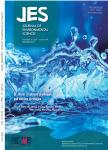Pb(Ⅱ) removal from water using Fe-coated bamboo charcoal with the assistance of microwaves
Pb(Ⅱ) removal from water using Fe-coated bamboo charcoal with the assistance of microwaves作者机构:State Key Laboratory of Pollution Control and Resources ReuseCollege of Environmental Science and EngineeringTongji University
出 版 物:《Journal of Environmental Sciences》 (环境科学学报(英文版))
年 卷 期:2013年第25卷第5期
页 面:1044-1053页
核心收录:
学科分类:083002[工学-环境工程] 0830[工学-环境科学与工程(可授工学、理学、农学学位)] 08[工学]
基 金:supported by the National Key Technology R&D Program of China (No. 2012BAJ21B01)
主 题:adsorption bamboo charcoal microwave assistance kinetics adsorption isotherms
摘 要:Bamboo charcoal(BC) was used as starting material to prepare iron-modified bamboo charcoal(Fe-MBC) by its impregnation in FeCl 3 and HNO 3 solutions simultaneously,followed by microwave *** material can be used as an adsorbent for Pb(Ⅱ) contaminants removal in *** composites were prepared with Fe molar concentration of 0.5,1.0 and 2.0 mol/L and characterized by means of N 2 adsorption-desorption isotherms,X-ray diffraction spectroscopy(XRD),scanning electron microscopy coupled with energy dispersive X-ray spectrometry(SEM-EDS),Fourier transform infrared(FT-IR) and point of zero charge(pH pzc) *** adsorption analyses showed that the BET specific surface area and total pore volume increased with iron *** adsorbent with Fe molar concentration of 2 mol/L(2Fe-MBC) exhibited the highest surface area and produced the best pore *** Pb(Ⅱ) adsorption process of 2Fe-MBC and BC were evaluated in batch experiments and 2Fe-MBC showed an excellent adsorption capability for removal Pb(Ⅱ).The adsorption of Pb(Ⅱ) strongly depended on solution pH,with maximum values at pH *** ionic strength had a significant effect on the adsorption at pH 〈 *** adsorption isotherms followed the Langmuir isotherm model well,and the maximum adsorption capacity for Pb(Ⅱ) was 200.38 mg/g for *** adsorption processes were well fitted by a pseudo second-order kinetic *** parameters showed that the adsorption of Pb(Ⅱ) onto Fe-MBC was feasible,spontaneous,and exothermic under the studied conditions,and the ion exchange mechanism played an significant *** results have important implications for the design of low-cost and effective adsorbents in the removal of Pb(Ⅱ) from wastewater.



